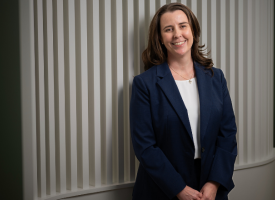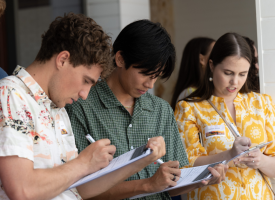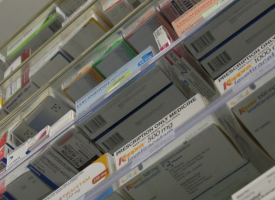Emergency Medicine Foundation grants announced
Dr Kim Hansen, Chair of AMA Queensland's Ramping Roundtable and patient advocate Maureen Williams spoke to the Today Show about how the Emergency Medicine Foundation is researching ways to reduce the pressure on EDs. During the interview, a magpie jumped in front of the camera for its own closeup, leaving southerners to think giant magpies have taken over Brisbane.

Transcript: AMA Queensland Ramping Roundtable Chair, Dr Kim Hansen, Today Show with Karl Stefanovic and Sarah Abo, Wednesday 28 February 2024
Subjects: Emergency Medicine Foundation grants; hospital and GP access
KARL STEFANOVIC: With a lack of GPs offering bulk billing, many Australians are putting up with long delays within our emergency departments.
SARAH ABO: We asked you at home about your frustrations. Rachel says GPs near her are ridiculous. She can't get in to see a doctor for up to 10 days where she lives. While Nicole says her time wasted waiting at the hospital is worth more than it costs to go to a doctor.
KARL STEFANOVIC: Those were two among a whole bunch of emails we got from you. To discuss, let's bring in emergency doctor, Dr Kim Hansen and Maureen Williams, a patient advocate. Thank you so much for your time, ladies, appreciate it. Kim, to you first up, are you on the ground in the emergency department? The stories, and this is no slight on the staff, but the stories coming out of emergency departments at the moment are horrific.
DR KIM HANSEN: Yeah, Karl that's right. There are long waits across Australia, unfortunately. Of course, in emergency we'll see the sickest patients very, very quickly. But for others, unfortunately the waits can be long at times and that's stressful for the patients, and of course, the staff feel it as well.
SARAH ABO: Kim, how are the staff handling this kind of pressure?
DR KIM HANSEN: We're in for the long haul, and we've been doing this for a long time, but of course it does wear away at you. We're a special breed, and I work with some fantastic people who are just great at getting on with the job. But I think having something like the Emergency Medicine Foundation fund research that involves the staff really helps lift our hopes about what we can do in the future.
KARL STEFANOVIC: Most of us do not go to emergency departments unless you absolutely have to and if your kids are really sick. You go into an emergency department, and the staff are doing their very best, but there are a lot of sick people in these places and it's a truly awful experience. I can't imagine what it's like for doctors. How do we rectify that from your perspective?
DR KIM HANSEN: It's a whole of health system problem. So, it's not just an emergency department problem, it's not even just a hospital problem. As we've heard, access to general practitioners is part of it, and part of the research we're funding is to look at what conditions can be treated elsewhere. For example, what can be treated in a home by sending out a mobile ED unit to the elderly in Brisbane, that's one of the research areas we're funding. And we just need to continue to chip away at looking at alternatives, looking at who can be treated at home or at alternative places, who can be discharged rather than admitted, who can be moved on a little bit faster perhaps from the hospital to alternative places for care.
SARAH ABO: I mean, Maureen, we know that obviously the care givers, the doctors and nurses themselves aren't the ones to blame. But what do patients do in a situation like this where they are left to wait for hours sometimes?
MAUREEN WILLIAMS: Unfortunately, there's not a lot that can be done. I mean, if a patient is in emergency, then the premise is that they're either sick or injured and with that comes anxiety and fear sometimes, and having to wait compounds the problems. It's particularly bad for people with mental health issues, the elderly, as we've discussed, and with people where English is not their first language, and unfortunately all you can do is wait.
There are a few things that can be done, like making sure that there's effective communication and that patients do know how long they're likely to wait and why there is a wait. But the light at the end of the tunnel, for me, is that organisations like the Emergency Medical Foundation are doing research into emergency medicine and starting to use patient participation. Because the bottom line is that at the end of the day, all medical research benefits a patient, and patients have daily lived experience. So what they've got to say is incredibly valuable, and that is now being utilised.
In fact, in places like Canada and the UK, they've been having patient participation for many years, and it's actually mandated. So, I'm hopeful, after being in this industry for a long time and spending an enormous amount of time in emergency myself as a patient, I'm hoping that this research will start to make a huge difference, especially for patients.
KARL STEFANOVIC: I've got to tell you this, and this is really crude, but it's a dog's breakfast in some emergency departments. It's just such an awful experience. And I've been in there many times over the last couple of years, and over the last 10 years in fact. And just the notion that you've got nowhere else to go except an emergency department. Inside these departments, you've clearly got mental health patients, you've got mental health patients on drugs, you've got parents with multiple children who are sick. It's just an absolute living nightmare and I can't believe we haven't been able to solve it in this first world country.
DR KIM HANSEN: It's a worldwide problem. Every area across Australia, but also across the world, is really grappling with emergency department overcrowding, and we take all comers. And so, we do see that huge variety that you describe, and many emergency departments can get overwhelmed by the number of people presenting.
KARL STEFANOVIC: Okay, look, sorry to interrupt. We're running out of time. The Emergency Medicine Foundation is pledging $1.3 million towards tackling this crisis. How will that help?
DR KIM HANSEN: It empowers us…
KARL STEFANOVIC: Hey, sorry. There's something very big behind you.
SARAH ABO: Hey, can you see that magpie. Oh dear.
KARL STEFANOVIC: It looks like you're going to need an emergency department after that.
SARAH ABO: As long as it’s not swooping, Karl, they might be okay.
KARL STEFANOVIC: All right, try and proceed with caution if you can. Thank you.
DR KIM HANSEN: Absolutely. But funding and research done by paramedics, doctors, nurses, and allied health clinicians that work in emergency departments is definitely the way forward so we can make the best decisions possible to work out how to fix this really complex problem.
KARL STEFANOVIC: Has anyone got a big gun?
SARAH ABO: That's not necessary. Just send them to the MCG, they'll be fine.
KARL STEFANOVIC: Hey ladies, I'm just riveted to this shot. If we can just take one more clean shot of it. There we go. Ladies, thank you for bearing with all sorts of problems this morning, especially a giant-sized magpie in the background. I know how you feel. I've got one here on the set.



